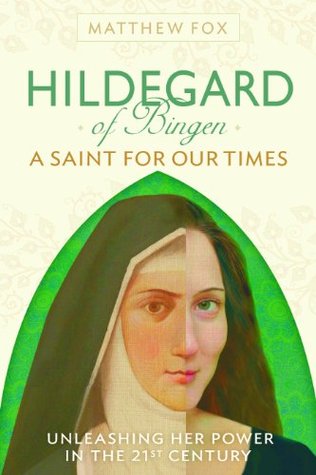Kindle Notes & Highlights
by
Matthew Fox
Read between
March 2, 2017 - September 17, 2019
It is in the spirit of Vatican II that Hildegard stresses that it isn’t only the leadership, but the rank and file who are called to be the church.
(yes, she was allowed to preach!)
Hildegard asks us to love our bodies—indeed, to love life itself, which she equates with God. Her theology is built on experience of the divine, which is to say on mysticism.
One of Hildegard’s special teachings is that we are all born in “original wisdom,” to quote her words. But we are tiny babes in our mother’s womb, and wisdom comes as a folded tent inside us. Life’s journey consists of setting up this tent.
if humans misuse creation, “God will permit creation to punish humanity”?
Who is this woman who calls us all “co-creators” with God?
Who is this woman who puts justice as the deciding ethical norm in ecclesial and cultural life, instead of blind obedience and christofascism?
Who is this woman who speaks of Christ and the “Word” as head of the church, not the pope and his curia?
God is a “not-being-silent” divinity.
Jesus and the Disinherited in which he lays out his conviction that Jesus’ teaching has often been “betrayed” by the church, for he sees the gospels as a means by which the oppressed or disinherited can learn while their backs are against the wall.
Vitality is an excellent synonym for spirituality. To be spiritual is to be aware—and thus fully alive, truly vital.
“to deal with men on any other basis, to treat them as if there were not vibrant and vital in each one the very life of the very God, is the great blasphemy.”
God is not only the creative mind and spirit at the core of the universe but that He…is love.”
For Hildegard, God is also light, a “true light that gives light to all lights,” and God “lives in every created thing.” It’s all the Cosmic Christ at work. The Word is “the Light of all lights, and it gives light of itself.”
God, she says, is the one “from whom all light is enkindled.” Christ is “the true Light that gives light to all lights.” The Cosmic Christ, or Word, is “the Light of all lights, and it gives light of itself.”
“I who am without origin and from whom every beginning goes forth, I who am the Ancient of Days, do declare that I am the day by myself alone. I am the day that does not shine by the sun; rather by me the sun is ignited. I am the Reason that is not made perceptible by anyone else; rather, I am the One by whom every reasonable being draws breath.”
“When you lack the verdancy of justice, your soul is dry, totally without tender goodness, totally without illuminating virtue.”
Thomas Aquinas, who lived fifty years after Hildegard, says that religion is, at its base, a virtue—a virtue of gratitude, a way of saying “thank you.” This presumes that religion is essentially about praise, and therefore fundamentally an inner thing—a soul thing, not a building or institutional thing.
Heschel writes, “It is customary to blame secular science and anti-religious philosophy for the eclipse of religion in modern society. It would be more honest to blame religion for its own defeats. Religion declined not because it was refuted, but because it became irrelevant, dull, oppressive, insipid. When faith is completely replaced by creed, worship by discipline, love by habit; when the crisis of today is ignored because of the splendor of the past; when faith becomes an heirloom rather than a living fountain; when religion speaks only in the name of authority rather than with the voice
...more
“Christianity stands or falls with its revolutionary protest against violence, arbitrariness, and pride of power and with its pleas for the weak. Christians are doing too little to make these points clear rather than too much. Christendom adjusts itself far too easily to the worship of power. Christians should give more offense, shock the world far more than they are doing now. Christians should take a stronger stand in favor of the weak rather than considering first the possible right of the strong.”
“The creation, of course, was fashioned to be adorned, to be showered, to be gifted with the love of the Creator. The entire world has been embraced by this kiss.”
Einstein resists rationalism and the idolatry of the intellect when he says, “Warn people not to make their intellect their god. The intellect knows methods but it seldom knows values, and they come from feeling.” What are Einstein’s prime values? “If one doesn’t play a part in the creative whole, he is not worth being called human. He has betrayed his true purpose.”19 So our true purpose is to participate in the creative whole. As Einstein confesses, “I believe in one thing—that only a life lived for others is a life worth living.”


